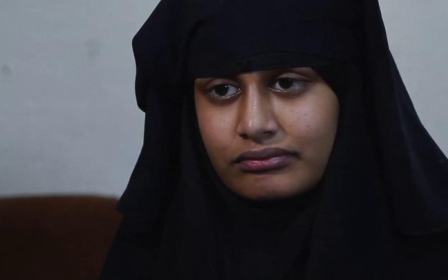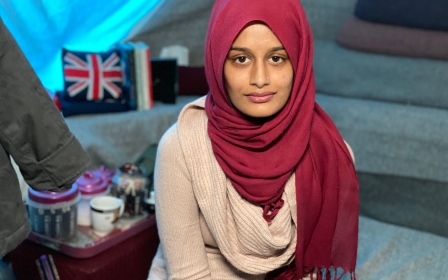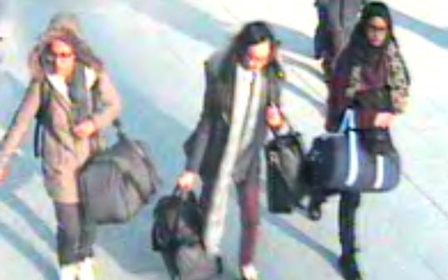Shamima Begum must face justice in the UK
![Shamima Begum is now aged 23, and remains in detention in a camp in northern Syria [Screenshot]](/sites/default/files/styles/max_2600x2600/public/images-story/abcnewsliveshamimabegum.jpeg?itok=UAVJI_FT)
It need not have ended up like this. With the right intervention at the right time, an adolescent Shamima Begum could have been prevented from destroying so many lives - including her own and that of her future children.
Instead, a human trafficker allegedly working for the Canadian espionage agency smuggled the teenager into Syria, according to a report in the London Times. When British spy chiefs discovered the truth, they helped the cover-up operation as the media's venom fuelled the fires of hatred directed at this young woman, bolstering harmful stereotypes and deepening divisions in British society.
Double agent Mohammed al-Rasheed, a Syrian people-smuggler thought to have helped dozens of Islamic State group fighters cross from Turkey to Syria, was hoping to get a Canadian passport by tipping off contacts at Ottawa's embassy with the locations of Western IS fighters when he helped Begum, then 15, and her friends Amira Abase, 15, and Kadzi Sultana, 16.
London's Metropolitan Police launched a frantic international search. The Canadian intelligence agency (CSIS) knew where the girls were, and kept quiet.
'Die in the desert'
Begum had turned 19 when Anthony Loyd, a British journalist, made contact with her in al-Hol camp in northern Syria, where spouses and children of Islamic State group fighters continue to be held following the violent collapse of the "caliphate".
Instead of bringing Shamima Begum - and her infant - back home, the UK government cut her off, dehumanised her, rendered her stateless and left her to die in the desert
Her story spread, and she was vilified by the British media. The unrepentant "jihadi bride" who hates her country so much she joined a terrorist group in a war against civilians, who, now her side had lost, wants to come home.
And instead of bringing her - and her infant - back home and supporting her through a deradicalisation programme, showing the respect for the rule of law, liberty and tolerance which this government believes are somehow uniquely "British values", this government cut her off, dehumanised her, rendered her stateless and left her to die in the desert. Her month-old baby did die, of pneumonia, less than two weeks later. It was the third of her children to die in Syria.
Sajid Javid, then-UK home secretary, said stripping her of citizenship "protect[ed] the British people". It's not yet known if he knew then that she was a victim of human trafficking, as such knowledge would surely add extra spite and cruelty to his decision.
The cover-up
When the Begum family's lawyers asked the Home Office about Rasheed's story after he was arrested by Turkey in 2015, according to the Times report, they were stonewalled.
Canadian officials had eventually come clean to their British counterparts, but hadn't gone public about handling the smuggler as an intelligence asset, and Westminster wasn't about to rat out a Five Eyes ally, even if they had assisted its citizens on a journey to terrorism.
This is a UK government which has invested huge amounts of money and social capital in its much-derided Prevent anti-radicalisation programme, with all its nefarious curtain-twitching, inform-on-your-neighbours surveillance of communities. But which, when faced with a chance to genuinely counter extremism, decided through its silence to become complicit in a friendly nation's delivery of children to the Islamic State group.
Travelling to Syria to support the Islamic State group is a criminal act. But what punishment should Begum face, and who should decide? Because whomever does decide will have to factor in that she was 15 years old, groomed, and then assisted in this criminal act by an agent of an allied nation.
While she has said she was only a "housewife" during her time in IS, the right-wing Daily Telegraph newspaper reported she was also an "enforcer" in the group's "morality police", doling out brutal punishments to women for breaches of the militants' strict dress code.
It is not entirely clear where the truth lies, but obviously the truth will not be found while Begum languishes in a tent somewhere in the Syrian desert.
A legal black hole
Begum must face justice, but she remains in a legal black hole. The UK's Supreme Court acknowledged that she could not receive a fair trial in Syria, but failed to reach the logical conclusion that she should therefore stand trial in the UK. The government had again kept mum, of course, keeping their knowledge from the court during its deliberations of how exactly she was smuggled into Syria.
In response to MEE's questions, the Home Office said it did not routinely comment on individual cases. "It is our long standing policy that we do not comment on operational intelligence or security matters," a government spokesperson told MEE.
Kurdish authorities who control the detention camps holding suspected IS-associated women and children have pleaded with the UK government to repatriate the estimated 50 British citizens held there. Only a handful of children, unaccompanied, have been brought home.
Leaving Begum and the others there isn't just morally repugnant, it makes no sense even from a security perspective. The choice should be clear: bring them home and jail or rehabilitate them, or leave them open to yet further radicalisation, entrenched by bitterness and tragedy, with renewed motive and zeal to fight against the interests of the UK.
It was in the UK that Begum was radicalised as a child. It was the UK authorities who failed to notice she was being groomed. It may have been a Canadian spy asset who trafficked her, but it was the UK that made an example of her, for the actions of a brainwashed child. It is the UK government which has stripped her of citizenship, washed its hands and declared its innocence.
Even before the latest reports of her trafficking, it was the UK that bore responsibility for Shamima Begum, the child and the woman she would become, and the allegations of this government's complicity in a cover-up means, more than ever before, the UK owes Shamima Begum the justice she deserves.
Follow James Brownsell on Twitter: @JamesBrownsell
The views expressed in this article belong to the author and do not necessarily reflect the editorial policy of Middle East Eye.
Middle East Eye propose une couverture et une analyse indépendantes et incomparables du Moyen-Orient, de l’Afrique du Nord et d’autres régions du monde. Pour en savoir plus sur la reprise de ce contenu et les frais qui s’appliquent, veuillez remplir ce formulaire [en anglais]. Pour en savoir plus sur MEE, cliquez ici [en anglais].





